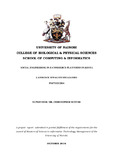| dc.contributor.author | Mwasambo, Lawrence M | |
| dc.date.accessioned | 2017-01-09T06:41:35Z | |
| dc.date.available | 2017-01-09T06:41:35Z | |
| dc.date.issued | 2016 | |
| dc.identifier.uri | http://hdl.handle.net/11295/99763 | |
| dc.description.abstract | Cyber criminals have extremely targeted eCommerce as they receive and use money, relay in technology, outsourced services and use of payment technologies like mobile money and online banking channels to carry out their day-to-day transactions. Criminals have shifted to use of social engineering as it easy to exploit user's natural inclination as compared to hacking. This research was based on mixed research methodology whose aim was to seek an in-depth understanding of concerns and mitigation approaches of social engineering in eCommerce platforms in Kenya. Purposive sampling was used and a sample size of 30 eCommerce organizations. Data was collected using questionnaires from IT managers and business managers. The questionnaires were created based on the four dimensions of Social Engineering Defensive Framework. Social engineering mitigation best practices are proposed. This report concludes by emphasizing the need of organizations using the derived best practices and incorporating security culture. | en_US |
| dc.language.iso | en | en_US |
| dc.publisher | University of Nairobi | en_US |
| dc.rights | Attribution-NonCommercial-NoDerivs 3.0 United States | * |
| dc.rights.uri | http://creativecommons.org/licenses/by-nc-nd/3.0/us/ | * |
| dc.subject | Social Engineering in E-commerce | en_US |
| dc.title | Social Engineering in E-commerce Platforms in Kenya | en_US |
| dc.type | Thesis | en_US |



